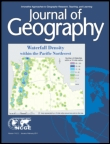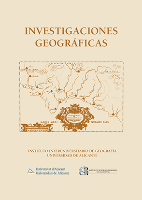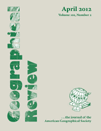
JOURNAL OF GEOGRAPHY
Scope & Guideline
Fostering Scholarly Excellence in Geographic Inquiry
Introduction
Aims and Scopes
- Geographical Education and Pedagogy:
The journal emphasizes innovative teaching methodologies and curricular developments in geography education, focusing on how pedagogical strategies can enhance geospatial thinking and ecological consciousness among students. - Environmental and Ecological Studies:
Research exploring the interactions between human activity and natural environments is a core focus, including studies on climate change, ecological risks, and sustainable development practices. - Geospatial Technologies and Applications:
The journal covers advancements in geospatial technologies, GIS applications, and their integration into educational settings, highlighting their importance in contemporary geographical research. - Geopolitical and Social Dynamics:
Papers addressing the relationships between geographical space, social structures, and political processes are prevalent, reflecting on issues of migration, urban development, and geopolitical conflicts. - Geological and Geomorphological Research:
The journal includes studies on geological formations, tectonic processes, and environmental changes over time, providing insights into both current and historical geographical processes.
Trending and Emerging
- Climate Change and Sustainability:
There is an increasing emphasis on research related to climate change, its impacts, and sustainable practices, reflecting global urgency in addressing environmental issues. - Integration of Digital Technologies in Geography Education:
Emerging themes highlight the role of digital tools and technologies, such as GIS and remote sensing, in enhancing geography education and research methodologies. - Social Justice and Geographic Inequalities:
The journal is increasingly publishing work that examines social justice issues within geographical contexts, such as antiracist pedagogy and the impact of spatial inequalities on marginalized communities. - Community Engagement and Participatory Research:
Studies focusing on community-based approaches to geography, including participatory research methods and civic engagement, are gaining traction as they align with contemporary educational practices. - Interdisciplinary Approaches:
There is a growing trend towards interdisciplinary research that combines geography with other fields, such as sociology, education, and environmental science, to address complex global issues.
Declining or Waning
- Traditional Physical Geography:
There has been a noticeable decline in studies focused solely on traditional physical geography, such as detailed landform analysis and climatic studies, as the journal shifts towards more interdisciplinary and applied approaches. - Historical Geography:
Research centered on historical geography and its methodologies has decreased, possibly overshadowed by contemporary issues that require immediate attention and practical solutions. - Local Case Studies in Isolation:
Papers focusing exclusively on localized geographical phenomena without broader implications or connections to global trends are becoming less common, as there is a growing preference for studies that contribute to global discussions.
Similar Journals

GEOGRAFICKY CASOPIS-Geographical Journal
Elevating geographic research through interdisciplinary collaboration.GEOGRAFICKY CASOPIS-Geographical Journal is a prestigious publication dedicated to advancing knowledge in the fields of geography and earth sciences, published by the SLOVAK ACADEMY OF SCIENCES, INSTITUTE OF GEOGRAPHY. With a rich history dating back to its inception in 1976, the journal serves as a vital forum for researchers and professionals to disseminate their findings across a range of topics including earth-surface processes, geography, planning, development, and geology. Notably, it maintains a respectable Q3 category ranking across these disciplines as of 2023, indicating its contribution to relevant academic discourse. The journal is indexed under critical databases and engages a global audience, making it an essential resource for scholars seeking to stay informed about contemporary issues and advancements in geography. Although currently not an open-access journal, it emphasizes the sharing of significant research findings and encourages submissions from various geographical contexts to enrich the scientific community. Geographical Journal's commitment to fostering interdisciplinary dialogue ensures its relevance and importance in shaping the future of geographical research.

Boletin Goiano de Geografia
Unveiling the Complexities of Human and Physical GeographyBoletin Goiano de Geografia is a distinguished academic journal dedicated to the field of Geography, published by the Universidade Federal de Goiás, Instituto de Estudos Socio-Ambientais. Since its inception in 1981, this Open Access journal has provided invaluable insights into the geographical dynamics of Brazil and beyond, promoting scholarly research and dialogue among geographers, environmentalists, and social scientists. The journal seeks to advance knowledge through the dissemination of research articles, reviews, and case studies that address contemporary issues in human and physical geography. With a commitment to fostering interdisciplinary collaboration, Boletin Goiano de Geografia serves as a vital resource for researchers, professionals, and students seeking to explore the complex interactions between society and the environment. Situated in the vibrant academic landscape of Goiana, Brazil, this journal enhances the global discourse on geographical studies and sustainability.

Geografie
Charting the course for future geographical advancements.Geografie, published by the Czech Geographic Society, serves as a vital resource in the fields of geography, planning, and development. With an E-ISSN of 1212-0014, this esteemed journal has been contributing to the academic landscape since its inception in 1992, providing a platform for rigorous research and diverse perspectives on earth-surface processes and regional development issues. Based in the heart of Prague at Charles University, it has reached an impressive convergence of scholarly excellence, ranking in the Q3 category for both Earth-Surface Processes and Geography, Planning and Development as of 2023. Although it does not currently offer open access, the journal is indexed in Scopus, holding significant positions within its realms—392nd out of 821 in Social Sciences and 89th out of 179 in Earth and Planetary Sciences—indicating its relevance and contribution to ongoing discussions in both disciplines. As an indispensable tool for researchers, professionals, and students alike, Geografie not only enhances the understanding of spatial processes but also fosters innovative solutions for contemporary geographical challenges.

Entorno Geografico
Connecting Researchers, Professionals, and Students WorldwideEntorno Geográfico is a premier open-access journal published by University of Valle, dedicated to the field of geography and environmental studies. Since its inception in 2002, this journal has provided a dynamic platform for researchers, professionals, and students to disseminate innovative findings and engage in critical discussions regarding geographical phenomena and environmental challenges. With an ISSN of 1692-0074 and an E-ISSN of 2382-3518, it is recognized for its commitment to high-quality peer-reviewed content that reflects cutting-edge research trends within the discipline. The journal aims to enhance understanding of socio-environmental processes and contribute to the formulation of sustainable solutions to pressing geographical issues. By fostering an open-access model, Entorno Geográfico ensures that valuable knowledge is widely accessible, encouraging collaboration and advancing education in the field. Located in Cali, Colombia, the journal reflects a strong regional focus while embracing a global perspective, making it an essential resource for the international geography community.

Investigaciones Geograficas-Spain
Connecting global insights through open access research.Investigaciones Geográficas-Spain is an esteemed academic journal published by the Universidad de Alicante, dedicated to advancing the fields of geography, planning, and development as well as earth and planetary sciences. With its commitment to open access since 1983, the journal ensures that research is readily available to a global audience, facilitating knowledge dissemination and collaborative discourse. As reflected in its 2023 Scopus rankings, it holds a commendable position within the Q3 category in both Earth and Planetary Sciences and Geography, Planning and Development, making it a noteworthy resource for scholars and practitioners in these disciplines. The journal's scope encompasses diverse geographical research, aiming to address pressing environmental and societal challenges through empirical studies and theoretical advancements. By contributing to the knowledge reservoir from Spain and beyond, Investigaciones Geográficas-Spain serves as a vital platform for researchers, professionals, and students seeking to enrich their understanding of geographical phenomena.

Revista Geografica de America Central
Navigating the Complexities of Central America's Geography.Revista Geografica de America Central is a distinguished scholarly journal published by the UNIV NACL, ESCUELA CIENCIAS GEOGRAFICAS, focusing on the dynamic field of geography, particularly within Central America. Since its inception in 1974, the journal has championed the dissemination of open-access research, fostering collaboration and innovation among researchers, professionals, and students alike. With an evolving scope that reflects the region's rich geographical diversity, this journal serves as a vital platform for sharing empirical studies, theoretical advancements, and methodological discussions that enhance our understanding of Central America's unique environmental and socio-economic challenges. Although it has experienced various coverage periods, the journal remains committed to advancing geographic scholarship and supporting open academic discourse. Its open-access model ensures that essential knowledge is readily available to an expanding global audience, making it an invaluable resource in the field.

GEOGRAPHICAL REVIEW
Transforming Perspectives on Spatial and Environmental ChallengesGEOGRAPHICAL REVIEW, published by Taylor & Francis Inc, is a premier academic journal recognized for its influential contributions to the fields of geography and earth-surface processes. With an ISSN of 0016-7428 and an E-ISSN of 1931-0846, this journal has established itself as a vital resource for researchers, professionals, and students alike. The journal maintains a strong reputation with a Q1 ranking in both Earth-Surface Processes and Geography, Planning and Development, reflecting its scholarly impact and relevance in the academic community. Additionally, it holds a notable position in Scopus rankings, placing #181 out of 821 in Social Sciences and #45 out of 179 in Earth and Planetary Sciences. Although it is not open access, the GEOGRAPHICAL REVIEW remains essential for those seeking to expand their understanding of spatial analysis and environmental processes from its historical inception in 1969 to its ongoing publications through 2024. Explore rigorous research articles, critical reviews, and innovative studies that shape the discourse in geography and earth sciences today.

Journal of Geographical Sciences
Unveiling Insights in Earth Sciences Since 2001.Welcome to the Journal of Geographical Sciences, a premier publication in the field of Earth and Planetary Sciences that has consistently demonstrated its impact and relevance since its inception in 2001. Published by SCIENCE PRESS, this esteemed journal is recognized for its rigorous peer-review process and high-quality research, achieving an impressive Q1 ranking in the 2023 category of Earth and Planetary Sciences (miscellaneous). With the latest Scopus ranking placing it at Rank #13 of 159, putting it in the top 8% of its field, the journal serves as a vital platform for disseminating significant findings and innovative methodologies in geography, environmental studies, and related disciplines. Although not an open-access journal, it offers exceptional visibility through its publication standards and accessibility in academic databases. Based in Beijing, China, the Journal of Geographical Sciences continues to pave the way for scholarly discourse and collaborative research, appealing to researchers, practitioners, and students dedicated to advancing our understanding of geographical phenomena.

Documents d Analisi Geografica
Connecting Scholars and Ideas in Geography and PlanningDocuments d'Anàlisi Geogràfica is a distinguished academic journal published by Universitat Autònoma de Barcelona, focusing on the fields of geography, planning, and earth-surface processes since its inception in 1988. With an Open Access policy implemented in 2012, the journal aims to facilitate the widespread dissemination of geographical research and insights, accessible to a global audience. Currently ranked in Q3 for both Earth-Surface Processes and Geography, Planning and Development categories, it serves as a vital platform for researchers, practitioners, and students to share their findings and enhance knowledge in these critical fields. The journal is indexed in Scopus, where it stands at rank #470 in Social Sciences and #106 in Earth and Planetary Sciences, reflecting its growing impact in relevant academic communities. Based in Barcelona, Spain, Documents d'Anàlisi Geogràfica continues to contribute substantially to geographical scholarship by exploring contemporary issues and advancements in a rapidly evolving world.

Anales de Geografia de la Universidad Complutense
Innovating Geography: Bridging Research and PracticeAnales de Geografia de la Universidad Complutense is a prominent journal in the fields of Geography and Urban Studies, published by Universidad Complutense de Madrid. With a rich academic tradition since its inception, this journal has been open access since 1981, ensuring that valuable research is readily available to scholars and practitioners alike. The journal holds a significant position within the academic community, reflected in its Q3 ranking in both Geography, Planning and Development and Urban Studies categories as of 2023, and it provides an essential platform for interdisciplinary research and dialogues on pressing geographical and urban issues. As part of the Scopus indexed database, it ranks #201 out of 279 in Urban Studies and #684 out of 821 in Geography, indicating its growing influence and relevance. Based in Madrid, Spain, the journal welcomes contributions that aim to advance knowledge, foster collaboration, and stimulate critical thinking in these dynamic fields.